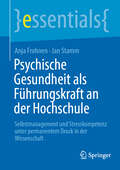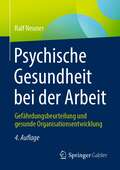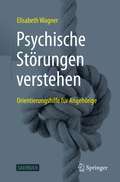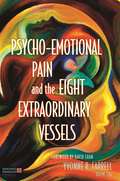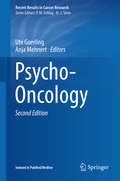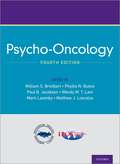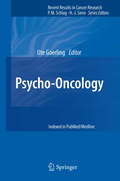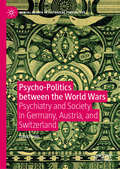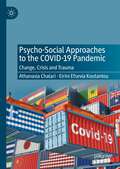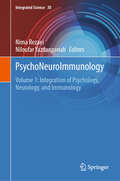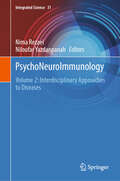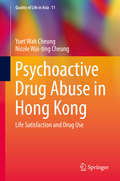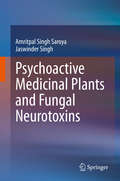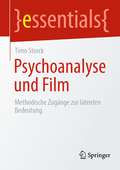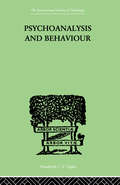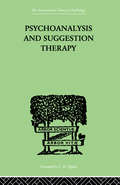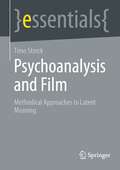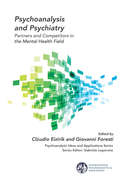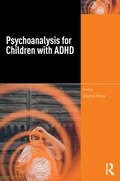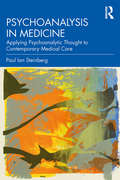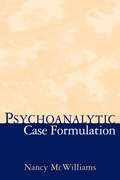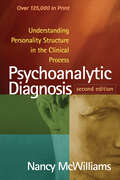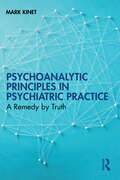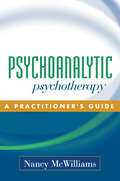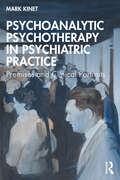- Table View
- List View
Psychische Gesundheit als Führungskraft an der Hochschule: Selbstmanagement und Stresskompetenz unter permanentem Druck in der Wissenschaft (essentials)
by Anja Frohnen Jan StammFührungskräfte in der Wissenschaft brauchen verlässliche Strategien für die Stärkung ihrer psychischen Gesundheit. Dieses essential erklärt die besonderen Herausforderungen im Wissenschaftssystem und bietet praktische Lösungen zur Stressbewältigung. Das Überwinden stressauslösender Gedanken fördert Resilienz. Entlastungspotentiale durch kluge Arbeitsorganisation bietet die Methode: das Managementhaus. – Wichtige Impulse für die Personalentwicklung und das betriebliche Gesundheitsmanagement an Hochschulen. Ein wertvoller Leitfaden für Führungskräfte in der Wissenschaft.
Psychische Gesundheit bei der Arbeit: Gefährdungsbeurteilung und gesunde Organisationsentwicklung
by Ralf NeunerDas Buch schlägt die Brücke zwischen Theorie und Praxis. Es klärt die wichtigsten Begriffe rund um das Thema psychische Belastung und geht auf die bestehenden gesetzlichen Verpflichtungen und Aufgabenverteilung ein. Kommentare zu Normen und relevante Gesetze wurden aktualisiert. Die vierte, umfassend überarbeitete und erweiterte Auflage beleuchtet Arbeitskonzepte, die unter den Begriff New Work fallen.Im Hauptteil werden Methoden und Verfahren zur Messung und Dokumentation von psychischen Belastungen erläutert. Dazu hat der Autor einen Darstellungs- und Kriterienkatalog erarbeitet, mit dem sich der Leser die spezifischen Vor- und Nachteile einschlägigen Verfahren zur Ermittlung psychischer Belastung erschließen kann. Die Ergebnisse der Analyse sind Handlungsgrundlage für die gesunde Organisationsentwicklung. Anhand zahlreicher Praxisbeispiele werden Maßnahmen und deren Nutzen zur Verbesserung der Qualität der Arbeitsgestaltung für die Beschäftigten und das Unternehmen aufgezeigt.Das Buch wendet sich an alle Interessierten, die wissen möchten, wie man psychische Belastung bei der Arbeit effektiv erfassen und in der Folge verringern kann. Dazu gehören Fachkräfte für Arbeitssicherheit genauso wie Arbeitsmediziner, Betriebsräte, Personalverantwortlich und alle, deren Anliegen die Verbesserung der Qualität der Arbeitsbedingungen ist.
Psychische Störungen verstehen: Orientierungshilfe für Angehörige
by Elisabeth WagnerDieses Sachbuch hilft Angehörigen und anderen Nahestehenden, psychische Störungen besser zu verstehen. Die häufigsten Krankheitsbilder werden beschrieben, Entstehungsbedingungen verständlich dargestellt. Es informiert über adäquate Behandlungsansätze und Beratungsangebote, vermittelt einen Überblick über die Wirkung von Psychopharmaka und Psychotherapie bei den einzelnen Störungen. Alle, die rund um Betroffene beteiligt sind, werden dabei unterstützt, einen möglichst konstruktiven Umgang mit den auftretenden Belastungen und die richtige Balance zwischen Unterstützung und Abgrenzung zu finden. Zum Kontext: 25 % der Menschen in Westeuropa erleiden einmal in ihrem Leben eine behandlungsbedürftige psychische Störung. Daher ist davon auszugehen, dass jeder Mensch in seinem nahen Umfeld zumindest mit einem/einer psychisch Kranken zu tun hat. Viele fragen sich: Wie kann ich diese Krankheit/Störung verstehen? Wie ist die Prognose? Wie soll ich mit dem/der Betroffenen umgehen? Wie kann ich helfen? Wer kann helfen? Wann sind Psychopharmaka nötig und wie gefährlich sind sie wirklich? Dieses Buch gibt Antworten. Über die Autorin: Dr. Elisabeth Wagner, Fachärztin für Psychiatrie und Psychotherapeutische Medizin, Lehrtherapeutin für systemische Familientherapie, betreut viele Betroffene, aber auch deren soziales Umfeld. Dieses zu unterstützen, ist ihr ein Anliegen.
Psycho-Emotional Pain and the Eight Extraordinary Vessels
by David Chan Yvonne R. FarrellThis book is unique in that it discusses the nature of human suffering and how patients can be helped to overcome psycho-emotional pain through work with the Eight Extraordinary Vessels. Emotional suffering and resistance to change can be an impediment to the healing process, with many physical conditions being resistant to treatment due to their psycho-emotional element. Understanding this suffering and providing a therapeutic environment which allows the patient to believe that things can be different improves the effectiveness of an Eight Extras treatment. Approaching the topic from the perspective of suffering means that the theory can be applied to both physical and emotional illness, including addiction, chronic pain, auto-immune conditions and hormonal disorders. This a very practical book and will include a full explanation of how to create an Eight Extras treatment and also case studies showing clinical use of the vessels and how to apply them. These case studies show how coping mechanisms and resistance develops and how important history is in the diagnostic process.
Psycho-Oncology
by Ute Goerling Anja MehnertPsycho-oncology is a thriving discipline in cancer care, and numerous research activities have been undertaken in the endeavour to improve treatment outcomes and to gain a better understanding of the psychosocial consequences of cancer. This book presents and discusses the latest findings from science and practice for a broad range of psychological and social issues related to cancer and its treatments. Not only are general psychosocial impacts of cancer described, but the very common fear of progression is elucidated. The relevance of psycho-oncology at different stages of disease (during oncological treatment, in rehabilitation, and during palliative care) is explained, and various psycho-oncological interventions are illustrated. Other important topics are the experience of being a cancer survivor, who may be cured but not be healthy, the psychological burden on relatives, and gender differences in coping with cancer. Quality of life and patient-reported outcomes are also commented on since they are among the key benchmarks for successful coping with the diagnosis of cancer, its treatment, and its late effects. The chapters are almost all written by distinguished scientists, but as we often learn most from those affected by cancer, one author speaks for herself as a patient.
Psycho-Oncology
by William S. Breitbart Phyllis N. Butow Paul B. Jacobsen Wendy W. T. Lam Mark Lazenby and Matthew J. LoscalzoOriginally published in 1998, Psycho-Oncology was the first comprehensive text in the field and remains the gold standard today. Previously led by Dr. Jimmie C. Holland, the founder of the field, this new edition is edited by a team of internationally renowned experts in psycho-oncology. The text reflects the interdisciplinary nature and global reach of this growing field. It covers evidence-based clinical practice guidelines from around the world, survivorship issues, psychotherapeutic interventions, and psychopharmacologic interventions. Thoroughly updated and developed in collaboration with the American Psychosocial Oncology Society and the International Psycho-Oncology Society, the fourth edition is a current, comprehensive reference for psychiatrists, psychologists, oncologists, hospice workers, and social workers seeking to understand and manage the psychological issues involved in the care of persons with cancer and the psychological, social, and behavioral factors that contribute to cancer risk and survival.
Psycho-Oncology
by Ute GoerlingPsycho-oncology is a thriving discipline in cancer care, and numerous research activities have been undertaken in the endeavour to improve treatment outcomes and to gain a better understanding of the psychosocial consequences of cancer. This book presents and discusses the latest findings from science and practice for a broad range of psychological and social issues related to cancer and its treatments. Not only are general psychosocial impacts of cancer described, but the very common fear of progression is elucidated. The relevance of psycho-oncology at different stages of disease (during oncological treatment, in rehabilitation, and during palliative care) is explained, and various psycho-oncological interventions are illustrated. Other important topics are the experience of being a cancer survivor, who may be cured but not be healthy, the psychological burden on relatives, and gender differences in coping with cancer. Quality of life and patient-reported outcomes are also commented on since they are among the key benchmarks for successful coping with the diagnosis of cancer, its treatment, and its late effects. The chapters are almost all written by distinguished scientists, but as we often learn most from those affected by cancer, one author speaks for herself as a patient.
Psycho-Politics between the World Wars: Psychiatry and Society in Germany, Austria, and Switzerland (Mental Health in Historical Perspective)
by David FreisThis book is about the psycho-political visions and programmes in early-twentieth century Germany, Austria, and Switzerland. Amidst the political and social unrest that followed the First World War, psychiatrists attempted to use their clinical insights to understand, diagnose, and treat society at large. The book uses a variety of published and unpublished sources to retrace major debates, protagonists, and networks involved in the redrawing of the boundaries of psychiatry’s sphere of authority. The book is based on three interconnected case studies: the overt pathologisation of the 1918/19 revolution led by right-wing German psychiatrists; the project of medical expansionism under the label of ‘applied psychiatry’ in inter-war Vienna; and the attempt to unite and implement different approaches to psychiatric prophylaxis in the movement for mental hygiene. By exploring these histories, the book also sheds light on the emergence of ideas that still shape the field to the present day and shows the close connection between utopian promises and the worst abuses of psychiatry.
Psycho-Social Approaches to the Covid-19 Pandemic: Change, Crisis and Trauma
by Anathasia Chalari Eirini Efsevia KoutantouThis book explores how meaning-making during the COVID-19 pandemic, and specifically during the period of the April 2020 lockdowns, may be derived from shared lived experience among participants, residing in diverse geographical regions. This study conducted 46 in-depth interviews with Greek participants residing in 13 district countries and 23 cities around the globe and argues that meaning making of the pandemic derives from shared lived experiences of radical change and everyday transformations, fearful as well as well as hopeful perceptions of crisis and trauma emerging through loss of life before the pandemic.
PsychoNeuroImmunology: Volume 1: Integration of Psychology, Neurology, and Immunology (Integrated Science #30)
by Nima Rezaei Niloufar YazdanpanahThis book seeks to represent the main concepts and theories related to psychoneuroimmunology with the aim of their application in clinical settings and formation of novel theories to further elucidate the mutual connection of the psyche and the physiology of humans' body. Psychoneuroimmunology, as an integration of popular research fields such as psychology, immunology, neurology, and neuroscience, is a perfect example of interdisciplinary and transdisciplinary studies that could potentially result in developing alternative diagnostic tools and treatment strategies besides facilitating the understanding of the pathophysiology of some conditions that might not properly be understood with a single point of view. Considering the stressful lifestyle and the high prevalence of neuropsychiatric, metabolic, and immune-related disorders, psychoneuroimmunology could be the path to the management of these conditions and reduction of the burden of the diseases
PsychoNeuroImmunology: Volume 2: Interdisciplinary Approaches to Diseases (Integrated Science #31)
by Nima Rezaei Niloufar YazdanpanahThis book seeks to represent the main concepts and theories related to psychoneuroimmunology with the aim of their application in clinical settings and formation of novel theories to further elucidate the mutual connection of the psyche and the physiology of humans' body. Psychoneuroimmunology, as an integration of popular research fields such as psychology, immunology, neurology, and neuroscience, is a perfect example of interdisciplinary and transdisciplinary studies that could potentially result in developing alternative diagnostic tools and treatment strategies besides facilitating the understanding of the pathophysiology of some conditions that might not properly be understood with a single point of view. Considering the stressful lifestyle and the high prevalence of neuropsychiatric, metabolic, and immune-related disorders, psychoneuroimmunology could be the path to the management of these conditions and reduction of the burden of the diseases.
Psychoactive Drug Abuse in Hong Kong: Life Satisfaction and Drug Use (Quality of Life in Asia #11)
by Yuet Wah Cheung Nicole Wai-ting CheungThis book studies young people’s use of psychoactive drugs and its social and psychological correlates in Hong Kong. Specifically, it focuses on how life satisfaction may affect drug use among a sample of psychoactive drug users in Hong Kong. The book addresses the dearth of research on the role of young people’s life satisfaction in their drug abuse and engagement in other risk behaviors in Hong Kong. It also examines how changes in the drug scene from heroin addiction to psychoactive party drug use since the late 1990s has necessitated a deeper exploration of the subculture of young people, which shapes their attitudes and behaviors regarding how they structure their lives and how they perceive the risks of drug use, in the context of the global trend of normalization of recreational drug use. Readers will benefit from the results of a rigorous analysis of a unique set of longitudinal data that reveals the factors influencing drug use among young psychoactive drug users, academic implications of the findings for social science theory and research on young people’s drug use, and practical implications of the findings for prevention and intervention services for young people in Hong Kong and other Asian societies.
Psychoactive Medicinal Plants and Fungal Neurotoxins
by Jaswinder Singh Amritpal Singh SaroyaThis book provides a clear and comprehensive overview of psychoactive medicinal plants, explaining in detail the species that are most commonly used in medicine, and describing their mechanism of action, the implicated toxin, clinical manifestation and therapeutic role. It explores the recent research in the area of psychoactive medicinal plants and fungal neurotoxins, and presents the various biochemical pathways involved and the bioactive targets. The book also discusses the current literature in the field, including the latest methodology used to identify the active compounds, their pharmacological and physiological properties along with their clinical efficacy. Compiling the most up to date information on major psychoactive medicinal plants and fungal neurotoxins, the book covers all major classes of psychoactive drugs, including stimulants, cognitive enhancers, sedatives and anxiolytics, psychotherapeutic herbs, analgesics and anesthetic plants, hallucinogens and cannabis.
Psychoanalyse und Film: Methodische Zugänge zur latenten Bedeutung (essentials)
by Timo StorckDieses essential widmet sich der Verbindung von Psychoanalyse und Film. Die Psychoanalyse eignet sich für eine methodisch geleitete Filmbetrachtung. Dabei kommt es nicht zu einer Anwendung der psychoanalytischen Theorie, sondern zu einer Anwendung ihrer Methode eines reflektierten In-Beziehung-Stehen zu einem Gegenüber. So können latente Bedeutungen in den Blick genommen und eine Interpretation entwickelt werden. Im vorliegenden essential werden die Möglichkeiten eines solchen Zugangs rekonstruiert und bestehende Ansätze vorgestellt. Schließlich wird der Vorschlag eines Leitfadens zur Durchführung einer filmpsychoanalytischen Interpretation gemacht. Zahlreiche Filmbeispiele dienen dabei der Veranschaulichung.
Psychoanalysis And Behaviour (International Library Of Psychology Ser.)
by Tridon, AndrFirst Published in 1999. Routledge is an imprint of Taylor & Francis, an informa company.
Psychoanalysis And Suggestion Therapy: Their Technique, Applications, Results, Limits, Dangers And
by Stekel, WilhelmFirst Published in 1999. Routledge is an imprint of Taylor & Francis, an informa company.
Psychoanalysis and Film: Methodical Approaches to Latent Meaning (essentials)
by Timo StorckThis essential is dedicated to the connection between psychoanalysis and film. Psychoanalysis is suitable for a methodically guided film viewing. This is not an application of psychoanalytical theory, but rather an application of its method of a reflected relationship to a counterpart. In this way, latent meanings can be taken into consideration and an interpretation can be developed. This essential reconstructs the possibilities of such an approach and presents existing approaches. Finally, a guideline for carrying out a film psychoanalytical interpretation is proposed. Numerous film examples serve to illustrate this.The translation was done with the help of artificial intelligence. A subsequent human revision was done primarily in terms of content.
Psychoanalysis and Psychiatry: Partners and Competitors in the Mental Health Field (The International Psychoanalytical Association Psychoanalytic Ideas and Applications Series)
by Cláudio Laks Eizirik Giovanni ForestiPsychoanalysis and Psychiatry: Partners and Competitors in the Mental Health Field offers a comprehensive overview of the many links between the two fields. There have long been connections between the two professions, but this is the first time the many points of contact have been set out clearly for practitioners from both fields. <P><P>Covering social and cultural factors, clinical practice, including diagnosis and treatment, and looking at teaching and continuing professional development, this book features contributions and exchange of ideas from an international group of clinicians from across both professions. <P><P>Psychoanalysis and Psychiatry: Partners and Competitors in the Mental Health Field will appeal to all practicing psychoanalysts and psychiatrists and anyone wanting to draw on the best of both fields in their theoretical understanding and clinical practice.
Psychoanalysis for Children with ADHD
by Sébastien PonnouIn Psychoanalysis for Children with ADHD, a group of eminent analysts highlight the positive impact that psychoanalytic work and the clinical space can have on children with Attention Deficit Hyperactivity Disorder.Thoroughly researched and informed by decades of work in the field, this volume includes contributions from well-known scientists and analysts such as François Gonon and Patrick Landman. Each contribution addresses sensitive and complex issues, including diagnostic criteria, behavioral problems and patterns, pharmacological intervention, ethical implications and the involvement of parents in treatment. Based on empirical data, the contributors offer a well-balanced critique of standardized approaches to ADHD, and make a case for psychoanalysis as an indispensable tool for both the child with ADHD and their caregivers. Throughout, the book shares the importance of the child having a safe space to explain, in their own words, their mind-body experience. Written in accessible language, this volume will be of interest to all psychoanalysts and psychotherapists working with children, as well as those offering specialized care in a medical or educational setting.
Psychoanalysis in Medicine: Applying Psychoanalytic Thought to Contemporary Medical Care
by Paul Ian SteinbergThis book shows how contemporary psychoanalytic thinking can be applied in the everyday practice of medicine to enhance the practice of family medicine and all clinical specialties. Dr. Steinberg analyzes his writings over the past 35 years—on psychiatry and family medicine, liaison psychiatry, and supervision and mentoring—based on developments in psychoanalytic thinking. Divided into sections based on different venues of medical practice, including family medicine clinics, inpatient medical and surgical units, and psychiatric inpatient units and outpatient programs, chapters illustrate how various concepts in psychoanalysis can enhance physicians’ understanding and management of their patients. A concluding section contains applications of psychoanalytic thought in non-clinical areas pertinent to medicine, including preventing suicide among physicians, residents, and medical students, sexual abuse of patients by physicians, and oral examination anxiety in physicians. Readers will learn to apply psychoanalytic concepts with a rational approach that enhances their understanding and management of their patients and practice of medicine generally.
Psychoanalytic Case Formulation
by Nancy McwilliamsWhat kinds of questions do experienced therapists ask themselves when facing a new client? How can clinical expertise be taught? From the author of the landmark Psychoanalytic Diagnosis, this book takes clinicians step-by- step through developing an understanding of each client's unique psychology and using this information to guide and inform treatment decisions. McWilliams shows that while seasoned practitioners rely upon established diagnostic categories for record-keeping and insurance purposes, their actual clinical concepts and practices reflect more inferential, subjective, and intuitive processes. Interweaving illustrative case examples with theoretical insights and clinically significant research, chapters cover assessment of client temperament, developmental issues, defenses, affects, identifications, relational patterns, self-esteem needs, and pathogenic beliefs.
Psychoanalytic Diagnosis, Second Edition: Understanding Personality Structure in the Clinical Process
by Nancy McwilliamsThis acclaimed clinical guide and widely adopted text has filled a key need in the field since its original publication. Nancy McWilliams makes psychoanalytic personality theory and its implications for practice accessible to practitioners of all levels of experience. She explains major character types and demonstrates specific ways that understanding the patient's individual personality structure can influence the therapist's focus and style of intervention. Guidelines are provided for developing a systematic yet flexible diagnostic formulation and using it to inform treatment. Highly readable, the book features a wealth of illustrative clinical examples. New to This Edition Reflects the ongoing development of the author's approach over nearly two decades. Incorporates important advances in attachment theory, neuroscience, and the study of trauma. Coverage of the contemporary relational movement in psychoanalysis. *A number of the case examples are entirely new.
Psychoanalytic Principles in Psychiatric Practice: A Remedy by Truth
by Mark KinetIn this approachable book, Mark Kinet offers a unique methodology for integrating psychoanalytic work in the psychiatric setting.Acknowledging the systemic rupture between psychoanalysis and psychiatric treatment, Kinet seeks to bridge the gap and offer a pathway for integrating the disciplines to provide integrative therapy for patients experiencing issues like personality problems, depression, anxiety and trauma. Integrating Freudian, Kleinian, Bionian, Winnicottian, Bowlbyan and Lacanian thought, Kinet provides an overview of psychoanalytic thinking and its benefits in a psychiatric setting. Kinet turns to philosophy, science, art and ethics to encourage a symbiotic relationship between the two disciplines.Written in Kinet's trademark accessible and personable manner, Psychoanalytic Principles in Psychiatric Practice will inspire the training psychiatrist and psychotherapist, as well as the more experienced practitioner, to consider a more panoptic approach to working with patients.
Psychoanalytic Psychotherapy
by Nancy McwilliamsBuilding on the enormous popularity of her two previous texts on diagnosis and case formulation, this important work from Nancy McWilliams completes the trilogy by addressing in detail the art and science of psychodynamic treatment. McWilliams distills the essential principles of clinical practice, including effective listening and talking; transference and counter transference; emotional safety; and an empathic, attuned attitude toward the patient. The author describes the values, assumptions, and clinical and research findings that guide the psychoanalytic enterprise, and shows how to integrate elements of other theoretical perspectives when necessary. She also discusses the phases of treatment and covers such neglected topics as educating the client about the therapeutic process, handling complex challenges to boundaries, and attending to self-care. Presenting complex clinical information in personal, nontechnical language enriched by in-depth clinical vignettes, this is an essential psychoanalytic work and training text for therapists.
Psychoanalytic Psychotherapy in Psychiatric Practice: Premises and Clinical Portraits
by Mark KinetIn this uniquely intimate and clinical book, Mark Kinet explores the vital role of psychodynamic psychotherapy in psychiatric work.Psychoanalytic Psychotherapy in Psychiatric Practice: Premises and Clinical Portraits includes over 70 case studies of patients receiving psychiatric care in various settings, from (semi-)residential treatment to outpatient support. Kinet draws on his extensive experience of conducting group and individual psychotherapy sessions, psychoanalysis in a traditional setting, and his integration of play therapy techniques. He introduces and explores seven foundational premises essential to the success of psychodynamic psychotherapy with these patients: the integration of intrapsychic and interpersonal forces and perspectives, the key impact of unconscious content and processes, the vital importance of the therapeutic relationship, the mobilisation of mentalising capacities, the interpretation of hidden motives, the emancipation resulting from enlightenment, and the importance of approaching this work with realism rather than an idealised perspective. The case studies highlight common mental issues such as anxiety, low mood and clinical depression, PTSD, and personality disorders, equipping the reader with the tools to understand and help a wide range of patients.Written in accessible language, this volume will be of great interest to psychiatrists, psychoanalysts, and psychotherapists, as well as anyone interested in gaining insight into real-life psychiatric practice.
